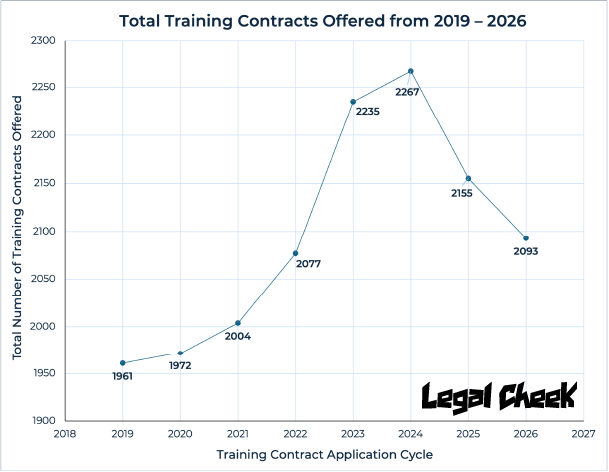New Legal Cheek research tracks eight years of data from leading City law firms to see how training contract numbers have fared
 The number of training contracts (TCs) on offer at the UK’s leading law firms remains higher than pre-Covid levels. While numbers have dipped over the past two years — hinting at a correction after post-pandemic hiring sprees — the graduate legal job market appears far more resilient than headlines about a wider “graduate jobpocalypse” might suggest.
The number of training contracts (TCs) on offer at the UK’s leading law firms remains higher than pre-Covid levels. While numbers have dipped over the past two years — hinting at a correction after post-pandemic hiring sprees — the graduate legal job market appears far more resilient than headlines about a wider “graduate jobpocalypse” might suggest.
While TC numbers have fluctuated year on year, firms are still offering more training contracts this cycle than they were between 2019 and 2022, even as other industries report widespread cutbacks.
This research tracks TC numbers at 67 leading City firms that have featured on every Legal Cheek Firms Most List since 2019. The firms were chosen as they had data recorded in each of these years. Together, these firms account for a major share of the corporate law graduate recruitment market, offering thousands of training contracts each year.
Steady growth, then a modest correction
As the chart below shows, the total number of training contracts offered across these 67 firms rose from 1,961 in the 2019 application cycle to a peak of 2,267 in the 2024 cycle — an overall increase of around 16%.
Since then, the number has dipped to 2,093 training contracts for the current 2026 cycle, which began this autumn, marking a near 8% fall from the 2024 peak.

Between 2021 and 2023, TC numbers surged more than 10%, with the biggest leap between 2022 and 2023 — from 2,077 to 2,235, a near 8% increase. That growth coincided with buoyant transactional markets and firms expanding their teams to keep pace with deal flow.
While the past two years have seen a gentle pullback, the downward trend has slowed and could be beginning to stabilise, with TC numbers down 4.94% in 2025 and 2.88% in 2026. The legal graduate recruitment market may now be finding its equilibrium after a period of post-pandemic optimism, but whether TC numbers continue to fall, level off, or rebound is a matter which only time can tell.
Possible explanations
This contraction from the 2024 peak aligns with broader hiring slowdowns and cutbacks reported across professional services. This decline is often attributed to factors like economic uncertainty, slower dealmaking, and AI supplanting entry-level roles.
The boom in solicitor apprenticeships may also be playing a part. Legal Cheek’s Solicitor Apprenticeship Most List shows 41 firms that offer a total of 194 apprenticeship places between them, providing school-leavers with a new route to qualification. As more firms invest in this alternative pathway, some appear to be rebalancing their graduate intakes, potentially contributing to the recent dip in traditional training contract numbers. Indeed if you add solicitor apprentice places to training contract numbers, entry level jobs in corporate law are around a record high.
US firms have generally displayed the most stability, with several even expanding their trainee cohorts. Sullivan & Cromwell and Ropes & Gray, for instance, have each doubled their training contract numbers between the 2019 and 2026 Most Lists — rising from six to 12 and seven to 15 respectively.
It’s also worth noting that this analysis excludes several high-growth US firms that have launched training contracts in recent years, such as Paul Weiss which now offers 12 training contracts annually.
By contrast, the Magic Circle — historically among the biggest graduate recruiters in law — have been flat or slightly down. Linklaters has held steady at around 100 TCs each year, while Clifford Chance has ranged between 110 and 95, and Freshfields between 100 and 80.
The verdict
While law graduates face fierce competition for training contracts, the numbers so far point to long-term stability, punctuated by short-term corrections that mirror wider market cycles rather than structural decline. Of course, AI may change that — but despite the hype it doesn’t yet seem to be a significant cause of a dip in training contract numbers. In the near term, a recession induced by the bursting of the possible AI bubble may be the bigger danger to look out for.
 (
( (
(